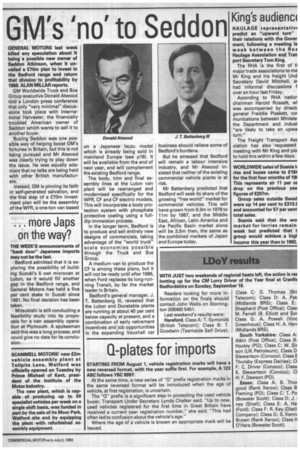GM's 'no' to Seddon
Page 7

If you've noticed an error in this article please click here to report it so we can fix it.
GENERAL MOTORS last Week killed any speculation about it being a possible new owner of Seddon Atkinson, when it unveiled a E70m plan to invest in the Bedford range and return that division to profitability by 1986. ALAN MILLAR reports.
GM Worldwide Truck and Bus Group executive Donald Atwood told a London press conference that only "very minimal" discussions took place with International Harvester, the financially troubled American owner of Seddon which wants to sell it to another buyer.
Buying Seddon was one possible way of helping boost GM's fortunes in Britain, but this is not being pursued and Mr Atwood was clearly trying to play down the issue. He was equally adamant that no talks are being held with other British manufacturers.
Instead, GM is pinning its faith in self-generated salvation, and the first step of a £70m investment plan will be the assembly of the WFR, a one-ton van based on a Japanese lsuzu model which is already being sold in mainland Europe (see p18). It will be available from the end of next year, and will complement the existing Bedford range.
The body, trim and final assembly lines at the Luton van plant will be rearranged and modernised specifically for the WFR, CF and CF electric models. This will incorporate a body protection system with phosphate protective coating using a fulldip immersion process.
In the longer term, Bedford is to produce and sell entirely new designs of commercials, taking advantage of the "world truck" scale economies possible through the Truck and Bus Group.
A medium van to produce the CF is among these plans, but it will not be ready until after 1986, when Ford replaces its long-running Transit, by far the market leader in Britain.
Bedford's general manager, J. T. Battenberg Ill, revealed that the Luton and Dunstable plants are running at about 40 per cent below capacity at present, and a combination of early retirement incentives and job opportunities in the expanding Vauxhall car
business should relieve some of Bedford's burdens.
But he stressed that Bedford will remain a labour intensive industry, and Mr Atwood insisted that neither of the existing commercial vehicle plants is at risk.
Mr Battenberg predicted that Bedford will seek its share of the growing "free world" market for commercial vehicles. This will have grown from 9.3m in 1978 to 11rn by 1987, and the Middle East, African, Latin America and the Pacific Basin market alone will be 3.5m then, the same as the combined markets of Japan and Europe today.




































































































